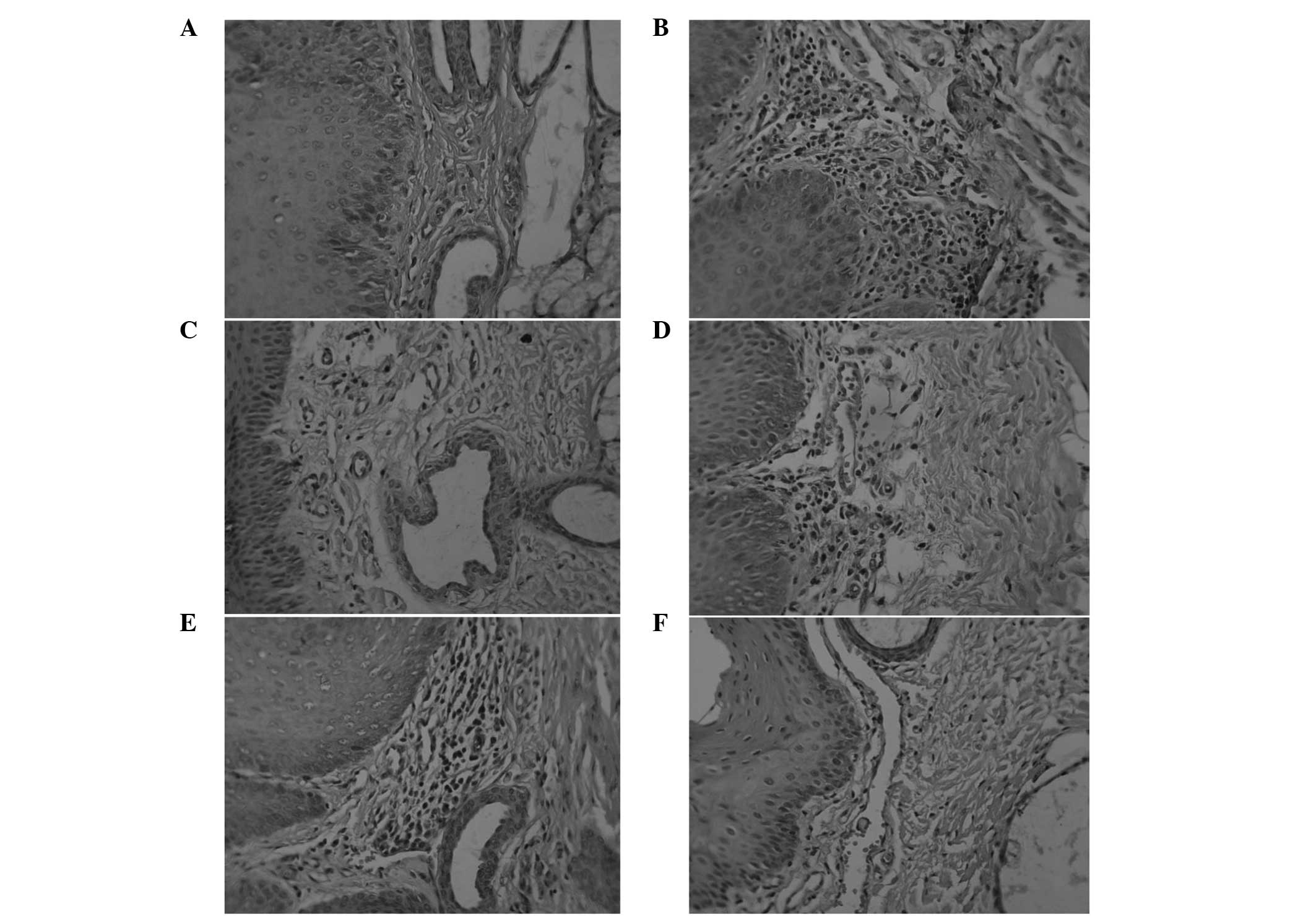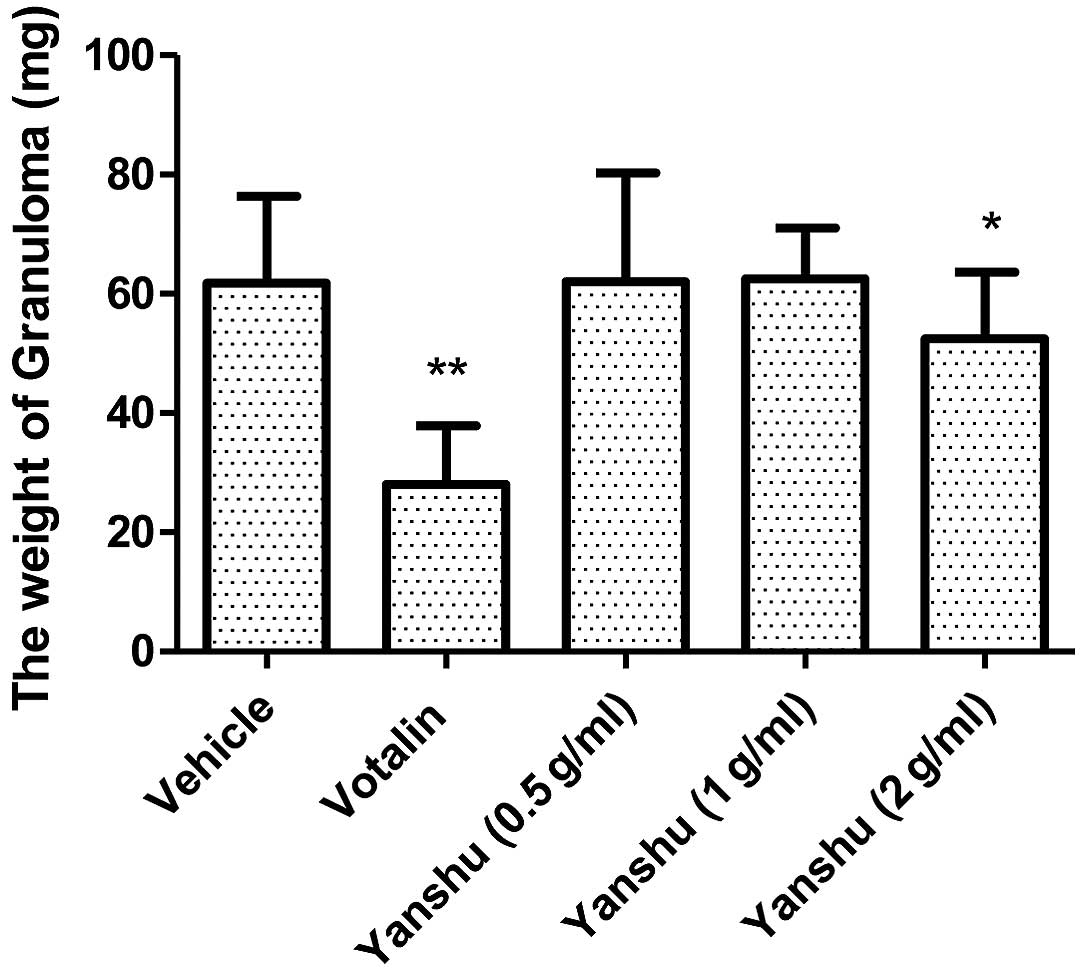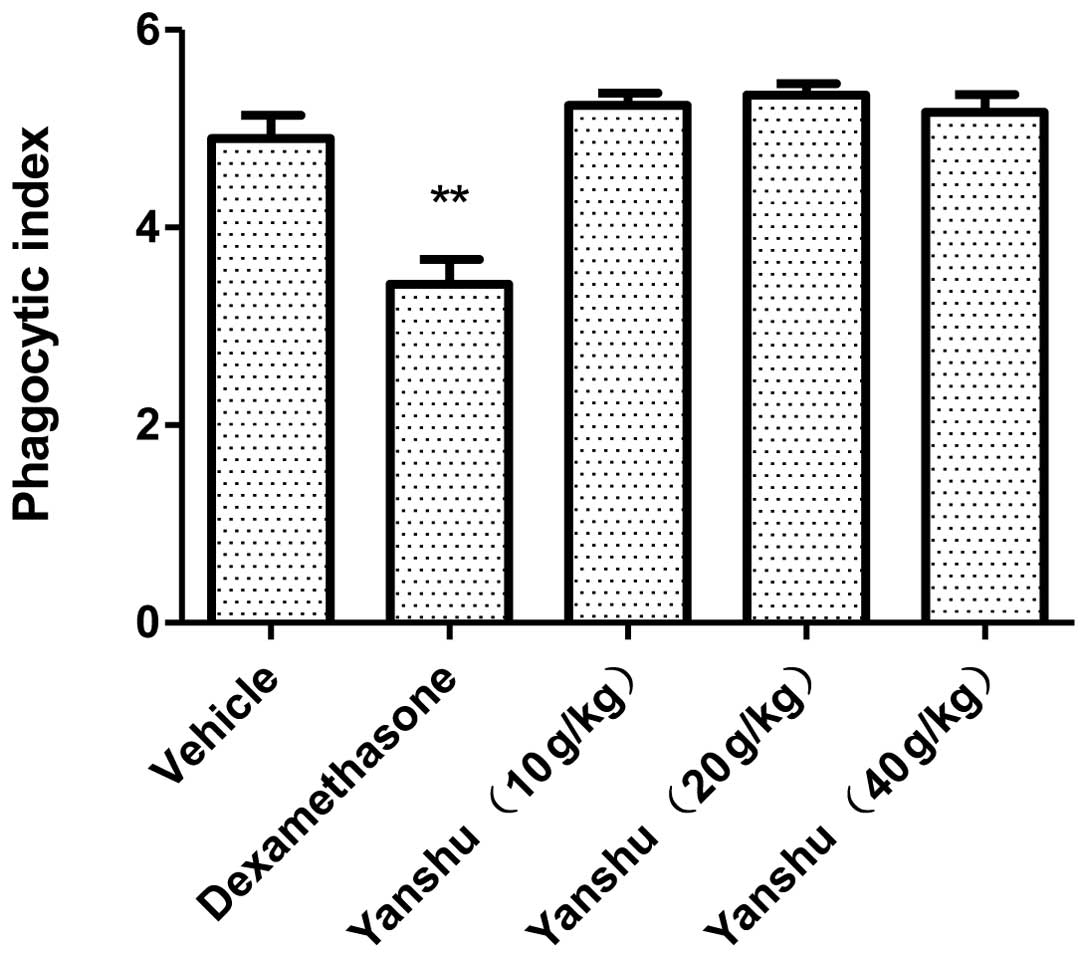Introduction
Chronic pharyngitis, a chronic inflammation of the
pharyngeal mucous membrane and submucous lymphoid tissues, is often
caused by unsatisfactory treatment of acute pharyngitis. The
disease may also occur in response to chronic inflammation caused
by alcohol abuse, overuse of the voice and cigarettes. Clinically,
chronic pharyngitis manifests itself as itching, dryness, soreness
of the throat, coughing and the feeling of a foreign body or
obstruction in the throat (1).
Chronic pharyngitis may have an infectious or non-infectious
etiology. In bacterial pharyngitis, group A β-hemolytic
Streptococcus and Staphylococcus aureus are most
frequently (5–36%) isolated (2,3).
Chronic pharyngitis may be caused by immune dysfunction of the
body, as the immune system is insufficient in suppressing
persistent microbial infection caused by bacteria, including
β-hemolytic Streptococcus and Staphylococcus aureus
(4).
Treatments for chronic pharyngitis vary depending on
the underlying cause. Immediate treatment includes
anti-inflammatory medications to reduce the swelling in the throat
and improve the comfort of the patient, as well as antibiotic or
antiviral medications that target infectious organisms in the
throat. Yanshu spraying agent (Yanshu), a potential therapeutic
agent for pharyngitis in clinical practice, consists of 11 herbs,
including Radix Sophorae Tonkinensis, Calyx seu Fructus
Physalis Francheti and Radix Scutellariae Baicalensis. A previous
study demonstrated that Yanshu exhibits potent anti-inflammatory
activity on the xylene-induced ear and carrageenan-induced paw
edema models, which may be mediated by inhibiting the expression of
cyclooxygenase-2 (5). However, the
pharmacological effects of Yanshu on chronic pharyngitis have not
yet been demonstrated. Thus, the aim of the present study was to
investigate the effects of Yanshu on chronic pharyngitis in animals
and the anti-inflammatory and antibacterial mechanisms.
Materials and methods
Drugs and chemicals
Yanshu was provided by Shandong Luye Pharmaceutical
Co, Ltd. (20120525; Yantai, China). Yanshu is composed of 11 plant
materials, including Radix Sophorae Tonkinensis, Calyx seu Fructus
Physalis Francheti, Periostracum Cryptotympanae, Radix Rehmanniae,
Fructus Arctii, Radix Scutellariae Baicalensis, Radix Paeoniae
Rubra, Semen Qroxyli, Semen Sterculiae Lychnophorae, Cortex Moutan
Radicis and Herba Menthae Haplocalycis, at a ratio of
1.7:1.7:1.7:2.4:1.7:1.7:2:1.7:1.7:1.7:1.7, respectively (dry
weight). All plant materials were selected according to the
pharmacopoeia of the People’s Republic of China (2010) (6). Yanshu (2 kg) was prepared as a
mixture of the aforementioned components and extracted with 24 and
then 20 liters distilled water at 100°C for 1.5 h, respectively.
After filtering the liquid, the extract was concentrated with a
rotary vacuum evaporator to reach a concentration of 2.0 g/ml which
was stored at 4°C.
Diclofenac diethylamine emulsion (Votalin) was
purchased from Beijing Novartis Pharma Co., Ltd (X0587; Beijing,
China). Penicillin round paper (diameter, 6 mm; content, 10 μg) was
purchased from Hangzhou Tianhe Microorganism Reagent Co., Ltd
(111209; Hangzhou, China) and dexamethasone was purchased from
Shandong Lukang Cisen Pharmaceutical Co., Ltd (120229203; Jining,
China).
Animals
Male Swiss mice (weight, 18–22 g) and male Wistar
rats (weight, 160–200 g) were purchased from Beijing Vital River
Laboratories Animals Technology Co., Ltd (Beijing, China). New
Zealand white rabbits (weight, 2.5–3 kg) were purchased from the
Experimental Animal Center of Shandong Luye Pharmaceutical Co.,
Ltd. (Yantai, China). All experimental procedures in the study were
performed in accordance with the guidelines for the Care and Use of
Laboratory Animals from the National Institute of Health and were
approved by the Ethics Committee of Yantai University (Yantai,
China). All the animals were housed in diurnal lighting conditions
(12:12 h) and provided with access to food and water ad
libitum.
Chronic pharyngitis animal model
The chronic pharyngitis animal model was established
as previously described (7), but
with minor modifications. Briefly, rabbits were sprayed with 2.5%
ammonia water into the pharynx mucosal twice per day (600 μl total)
for 15 consecutive days. On day 8, 0.5 ml oil of turpentine was
injected into the pharynx mucosal of the rabbits. The rabbits were
randomly divided into the control, model, watermelon frost
(reference drug used in acute and chronic pharyngitis) and Yanshu
low-, medium- and high-dose groups (n=5 per group). Each treatment
group received the respective treatment of vehicle, 200 mg
watermelon frost or 300 μl Yanshu (0.5, 1 or 2 g/ml) sprayed into
the pharynx mucosal four times a day for 14 consecutive days. After
24 h following the last administration, animals were anesthetized
and pharyngeal tissue was removed and fixed in 4% formalin. The
rabbits were anesthetized with urethane (1 g/kg). Tissues were
sliced for hematoxylin and eosin staining to observe pathological
differences between the groups under a light microscope (Olympus
Co., Ltd., Beijing, China).
Cotton pellet-induced granuloma tissue
formation test
The cotton pellet-induced granuloma tissue formation
animal model was established as previously described (8), but with minor modifications. Briefly,
rats were anesthetized with 350 mg/kg chloral hydrate and two
sterilized cotton pellets, that weighed 20 mg each, were implanted
subcutaneously on each side of the nape through a small ventral
incision in the nape of the rats. Following implantation of the
cotton pellets, each rat treatment group (n=10 per group) received
topical treatment of vehicle, 100 mg Votalin or 300 μl Yanshu at
0.5, 1 or 2 g/ml, four times a day for seven consecutive days.
Eight days following implantation of the cotton pellets, the
animals were anesthetized with chloral hydrate. Each implanted
cotton pellet was removed with the surrounding fibrovascular tissue
and dried at 60°C for 12 h. The dry weight was then measured and
the net granuloma weight was calculated by minusing the original
pellet weight from the dry pellet weight. The granuloma inhibition
rate was calculated as follows: Granuloma inhibition rate (%) = 1 -
(drug group average granuloma net weight)/(control group average
granuloma net weight) × 100.
Antibacterial test in vitro
Antibacterial tests were performed using the
cylinder-plate method (9). A
tested 200 μl bacteria suspension (β-hemolytic Streptococcus
and Staphylococcus aureus; concentration,
1×107/ml) was daubed by SS-Spreader (Egoan Technology
Co., Ltd., Beijing, China) on culture medium (Staphylococcus
was cultured using nutrient agar plate and β-hemolytic
Streptococcus using blood plate) under aseptic conditions.
The ready plates were dried at room temperature for 15 min and the
cylinder-plates (6×8×10 mm) were placed on the medium. Normal
saline (200 μl) or varied concentrations of Yanshu (2, 1, 0.5,
0.25, 0.125, 0.0625 and 0.03125 g/ml; 200 μl) were added to the
cylinder, respectively. Plates were then stored at 4°C for 2 h and
cultured at 37°C for 24 h. The diameters of the effective
inhibitory zone of Yanshu were measured.
Spleen index, thymus index and immunocyte
count
In total, 50 mice were randomly divided into
vehicle, dexamethasone (5 mg/kg body weight per day) and three
Yanshu groups (10, 20 and 40 g/kg body weight per day; n=10 per
group). Mice received oral administration of the corresponding
drugs once per day for seven consecutive days. After 24 h following
the last administration, blood samples were collected for leukocyte
and lymphocyte counts. Mice were then sacrificed and the weight of
the spleen and thymus were measured. The index was calculated as
follows: Organ index = organ weight (mg)/body weight (g).
Carbon particle clearance test
Phagocytosis rates of monocytes and macrophages were
estimated by calculating the speed of carbon particle clearance.
The carbon particle clearance test was performed as previously
described (1), but with minor
modifications. Briefly, 50 mice were randomly divided into a
vehicle, dexamethasone (5 mg/kg body weight per day) and three
Yanshu groups (10, 20 and 40 g/kg body weight per day; n=10 per
group). Mice received oral administration of the corresponding
drugs once a day for seven consecutive days. After 2 h following
the last administration, Indian ink (0.1 ml/10 g; Beijing Xizhong
Chemical Co., Ltd., Beijing, China) was injected intravenously and
20 μl blood samples were collected following 3 min and 13 min. The
blood samples were hemolyzed in 1 ml Na2CO3
(0.1%) and the concentration of carbon particles was determined by
measuring the optical density (OD) at 600 nm. The clearance index
(CI) and phagocytic index (PI) were calculated as follows: CI (K) =
[logOD1 (control) - logOD2
(treated)]/t1–t2; and PI = body weight/(liver
weight + spleen weight) ×3√k.
Statistical analysis
Data are expressed as the mean ± SD. Data were
analyzed using one-way analysis of variance with the Bonferroni
post hoc test used for multiple t-tests. P<0.05 was considered
to indicate a statistically significant difference.
Results
Effect of Yanshu on chronic pharyngitis
in rabbits
Under a light microscope, a large number of
inflammatory cells were observed in the pharyngeal tissue following
administration of 2.5% ammonia and the number of lymphocytes
increased significantly. Compared with the model group, the
watermelon frost (reference drug) and Yanshu high-dose treatment
groups showed a significantly reduced number of inflammatory cells
(Fig. 1).
Effect of Yanshu on chronic granulomatous
inflammation in rats
When treated with Votalin or high-dose Yanshu, the
granuloma weight decreased significantly (P<0.01 and P<0.05,
respectively) as compared with the model group (Fig. 2).
Antibacterial activity of Yanshu in
vitro
Yanshu demonstrated antibacterial activity against
Staphylococcus aureus (≥0.125 g/ml) and β-hemolytic
Streptococci (≥1 g/ml). The results are shown in Table I.
 | Table IAntibacterial activity of Yanshu in
vitro (cylinder-plate method). |
Table I
Antibacterial activity of Yanshu in
vitro (cylinder-plate method).
| Diameter of
inhabiting circles (mm) |
|---|
|
|
|---|
| Drug | Staphylococcus
aureus | β-hemolytic
Streptococcus |
|---|
| Saline | - | - |
| Penicillin 10 μg | 44.3±1.6 | 19.3±0.6 |
| Yanshu 2 g/ml | 10.7±0.6 | 7.5±0.5 |
| Yanshu 1 g/ml | 8.7±0.6 | 6.7±0.6 |
| Yanshu 0.5 g/ml | 7.7±1.2 | - |
| Yanshu 0.25 g/ml | 8.7±0.6 | - |
| Yanshu 0.125
g/ml | 8.3±0.6 | - |
| Yanshu 0.0625
g/ml | - | - |
| Yanshu 0.03125
g/ml | - | - |
Effect of Yanshu on immune organs and
immune cells
Compared with the vehicle group, the thymus and
spleen indexes in the Yanshu-treated mice did not change
significantly. However, the dexamethasone-treated mice exhibited a
significant decrease in thymus and spleen indexes (P<0.01;
Fig. 3A). There were no marked
changes in the leukocyte and lymphocyte concentrations of mice
treated with 10, 20 and 40 g/kg Yanshu, but treatment with
dexamethasone resulted in a significant decrease in the number of
lymphocytes (P<0.01; Fig.
3B).
Effect of Yanshu on the phagocytic index
of monocyte and macrophages in mice
The phagocytic index in Yanshu-treated mice did not
change significantly compared with the vehicle group. However,
dexamethasone-treated mice exhibited a significant decrease in the
phagocytic index (P<0.01; Fig.
4).
Discussion
The present study investigated the anti-inflammatory
and antibacterial effects of Yanshu in relieving chronic
pharyngitis, as well as the effect Yanshu has on the immune system.
The results demonstrated that Yanshu inhibits chronic inflammation
in animals and demonstrates antibacterial effects in vitro.
As an anti-inflammatory drug, Yanshu does not affect immune
function as compared with dexamethasone.
Chronic pharyngitis is chronic inflammation of the
pharyngeal mucous membrane. In the present study, an
ammonia-induced rabbit chronic pharyngitis model was established
(10,11) to investigate the anti-inflammatory
effects of Yanshu. The results revealed that Yanshu suppresses
ammonia-induced chronic inflammation in pharyngeal tissue. Similar
results were also observed in the cotton pellet-induced
granulomatous inflammation model (12). The results indicate that Yanshu
exhibits inhibitory effects against chronic inflammation.
Bacterial infection, particularly β-hemolytic
Streptococcus infection, is one of the etiologies of
pharyngitis (13,14). To investigate the antibacterial
effects of Yanshu, the cylinder-plate method was used. This is a
sensitive and popular method for antibacterial experiments and by
measuring the diameter of the inhibition zones, the antibacterial
effects of Yanshu were analyzed. Treatment with Yanshu
significantly inhibited the growth of β-hemolytic
Streptococcus and Staphylococcus aureus. Therefore,
the results indicate that Yanshu exerts good antibacterial
effects.
Pharyngitis is often a sign of immune dysfunction,
as the immune system is usually robust enough to prevent throat
infections. Chronic pharyngitis may be caused by immune
dysfunction, as the immune system is insufficient in suppressing
persistent infections, including Staphylococcal and Streptococcal
infections. Therefore, treatment for pharyngitis needs to enhance
immune function or at least not suppress function, unlike
glucocorticoids that are commonly administered for pharyngitis
(15–17). In the present study, Yanshu was
found to have no inhibitory effects on immune function when
compared with dexamethasone.
In conclusion, the present study demonstrated that
Yanshu exhibits anti-inflammatory and antibacterial effects in
vivo. In addition, Yanshu did not exhibit significant effects
on the immune system in vitro. These observations support
the use of Yanshu as a safe therapeutic agent for the treatment of
chronic pharyngitis.
Acknowledgements
The study was supported by the 11th Five Years Key
Programs for Science and Technology Development of China (grant no.
2010ZX09102-207) and the Taishan Scholar Project. The authors thank
Professor Tongshen Liu for providing technical assistance in the
pathological observations.
References
|
1
|
Sun Y, Zang Z, Xu X, Zhang Z, Zhong L, Zan
W, Zhao Y and Sun L: Experimental investigation of the
immunoregulatory and anti-inflammatory effects of the traditional
Chinese medicine ‘Li-Yan Zhi-Ke Granule’ for relieving chronic
pharyngitis in rats. Mol Biol Rep. 38:199–203. 2011.PubMed/NCBI
|
|
2
|
Whiley RA and Beighton D: Emended
description and recognition of Streptococcus constellatus,
Streptococcus intermedius, and Streptococcus
anginosus as distinct species. Int J Syst Bacteriol. 41:1–5.
1991.PubMed/NCBI
|
|
3
|
Belko J, Goldmann DA, Marcone A and Zaidi
AK: Clinically significant infections with organisms of the
Streptococcus milleri group. Pediatr Infect Dis J.
21:715–723. 2002. View Article : Google Scholar : PubMed/NCBI
|
|
4
|
Margarino G, Scala M, Rossi E, Mereu P,
Dessy G, Sogno G, Bonelli L and Badellino F: Immunologic study of
patients with chronic pharyngitis. Acta Otorhinolaryngol Ital.
9:399–402. 1989.(In Italian).
|
|
5
|
Zhang J, Wang H, Wang T, Chong Y, Yu P, Lu
C, Xue Y, Fu F and Zhang L: Anti-inflammatory activity of Yanshu
spraying agent in animal models. Exp Ther Med. 5:73–76.
2013.PubMed/NCBI
|
|
6
|
Chinese Pharmacopoeia Commission, .
Pharmacopoeia of the People’s Republic of China. Beijing: Chinese
Medical Science and Technology Press; 2010
|
|
7
|
Fan KH: Influence of Yanyanling granules
on the morphopathology of chronic pharyngitis in rabbits. Hua Xi
Yao Xue Za Zhi. 28:60–61. 2013.(In Chinese).
|
|
8
|
Moreira LQ, Vilela FC, Orlandi L, Dias DF,
Santos AL, da Silva MA, Paiva R, Alves-da-Silva G and Giusti-Paiva
A: Anti-inflammatory effect of extract and fractions from the
leaves of Byrsonima intermedia A. Juss. in rats. J
Ethnopharmacol. 138:610–615. 2011. View Article : Google Scholar : PubMed/NCBI
|
|
9
|
Breier AR, Garcia CV, Oppe TP, Steppe M
and Schapoval EE: Microbiological assay for azithromycin in
pharmaceutical formulations. J Pharm Biomed Anal. 29:957–961. 2002.
View Article : Google Scholar : PubMed/NCBI
|
|
10
|
Jia WX, Xu QR, Ren XH, He N, Zhao Y, Wang
LJ, Yang LH and Yu ZY: Effects of Jinhoujian spraying agent for the
expression of interleukin-1 and 125I-EGF of chronic pharyngitis.
Hebei Yi Yao. 32:2697–2698. 2010.(In Chinese).
|
|
11
|
Zhong Q, Peng SL and Li X: The research of
Yinxuanye for chronic pharyngitis. Shandong Zhong Yi Za Zhi.
19:99–100. 2000.(In Chinese).
|
|
12
|
Barreto RR, Franco Ede S, Brasileiro CF,
de Oliveira AP, Dimech GS, Malta DJ, Cazuzu JS, Leite AC, da Silva
TG and Maia MB: Early undernutrition is associated with attenuated
inflammatory response and alteration in pharmacological efficacy of
indomethacin in rats. Eur J Pharm Sci. 46:56–63. 2012. View Article : Google Scholar : PubMed/NCBI
|
|
13
|
Murray RC and Chennupati SK: Chronic
streptococcal and non-streptococcal pharyngitis. Infect Disord Drug
Targets. 12:281–285. 2012. View Article : Google Scholar : PubMed/NCBI
|
|
14
|
Choby BA: Diagnosis and treatment of
streptococcal pharyngitis. Am Fam Physician. 79:383–390. 2009.
|
|
15
|
Kumari JO and Rajendran R: Effect of
topical nasal steroid spray in the treatment of non-specific
recurrent/chronic pharyngitis - a trial study. Indian J Otolaryngol
Head Neck Surg. 60:199–201. 2008. View Article : Google Scholar : PubMed/NCBI
|
|
16
|
Sadowitz PD, Page NE and Crowley K:
Adverse effects of steroid therapy in children with pharyngitis
with unsuspected malignancy. Pediatr Emerg Care. 28:807–809. 2012.
View Article : Google Scholar : PubMed/NCBI
|
|
17
|
Wing A, Villa-Roel C, Yeh B, Eskin B,
Buckingham J and Rowe BH: Effectiveness of corticosteroid treatment
in acute pharyngitis: a systematic review of the literature. Acad
Emerg Med. 17:476–483. 2010. View Article : Google Scholar : PubMed/NCBI
|


















